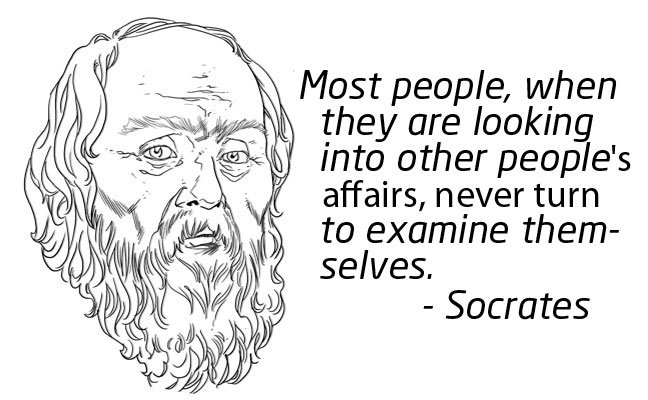
In this series of posts, I'd share some of the historical and philosophical perspective that will be the foundation of my coming graphic novel about Socrates, Polis: The Trial of Socrates. You can find Part I HERE and Part II HERE.

Plato had a longstanding relationship with Socrates, and he was present at his trial. From Socrates' short association with Plato's uncle Critias, and the longer friendship with his older cousin Charmides, Socrates appears to have been a friend of Plato's family for some time. The question becomes, “Where in Plato's dialogs does Socrates end and Plato begin?” How much can we rely on Plato to mirror the precepts of his teacher?
It is generally agreed that Plato's dialogs may be split into three periods: the Early, Middle, and Late periods. In the Early period Plato tries to represent Socrates as he was, and this includes the Apology, Euthyphro, Crito, and Gorgias. During the Middle Period, Plato's own thought begins to flower, and he uses Socrates as his mouthpiece. This period includes the Symposium, Phaedo, and The Republic. Finally, in the Late Period, Plato drops Socrates as his protagonist altogether, and the philosopher's last work, The Laws, is especially representative of this trend.
Since Socrates is only represented in Plato's Early and Middle periods, we will concentrate on these; and while there are many differences between these two representations of “Socrates”, we will only focus on those that are pertinent to his individualism.
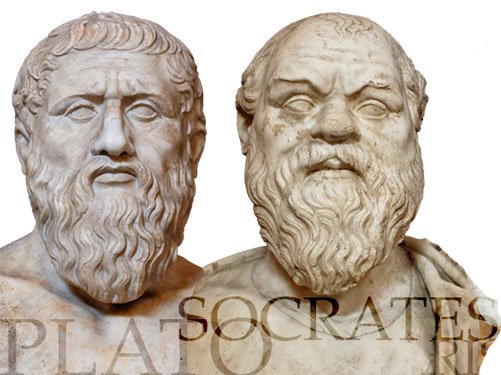
Plato & Socrates
The first major difference between the Socrates of Plato's early and later works is on his conception of the “soul”. Before Socrates, there is no conception of the soul in Greek philosophy or religion. At most, when a person died, it was thought that his shade would wander aimlessly in the caverns of Hades for eternity. For Socrates, however, the soul is something within us, a thing special and valuable that encapsulates our personality and moral nature. For the Socrates of the early dialogs, “our soul is our self – whatever that might turn out to be. It is the 'I' of psychological function and moral imputation – the 'I' in 'I feel, I think, I know, I act.'”
But this is a far cry from the modern notion of soul that has come down to us from our Christian heritage; it is a far cry from that same notion that the early Christian fathers hijacked from the middle dialogues of Plato himself. Listen to the Socrates of the Phaedo as he councils his disciples:
Answer me then: what is it that, present in a body, makes it living? – A soul.
Whatever the soul occupies, it always brings life to it? – Of course.
Is there, or is there not, an opposite to life? – There is: death.
So the soul will never admit the opposite of that which it brings along, as we agree from what has been said? – Most certainly.
[V]ery well, what do we call that which does not admit death? – Deathless.
So we have proved that the soul is deathless.
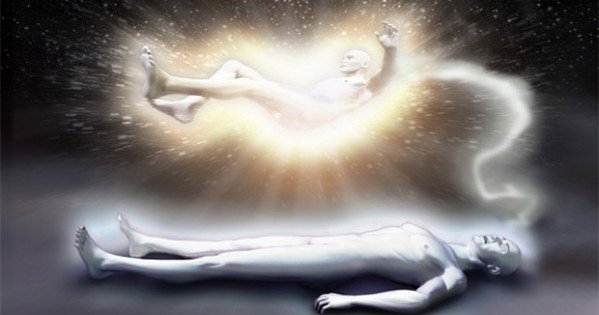
Source
Nowhere in Plato's early works does Socrates make such a claim. The best he can do in the Apology is to counsel that one should not fear death because no one knows what lies on the other side; and if it is just an eternal sleep, then so much the better. Socrates' idea of soul had no metaphysical or otherworldly connotation. It was a moral appeal that spoke to our autonomous nature and showed the individual value inherent in us all.
Wrapped up in this mystery of the soul is the difference between Socrates' and Plato's conception of the essence of things. Everywhere in the early dialogs we find Socrates asking the same questions: What is piety? What is justice? What is virtue? Socrates believed that everyone has an incomplete knowledge of what these terms mean, even he; but he was certain that once complete knowledge could be found, men would live happier, fuller lives.
Socrates called these complete definitions the “essence” of a thing, or the “form” of a thing. But in Plato's later works we get a vastly different view of these “Forms”. To Plato, they are no longer definitions but existents that reside outside of space and time. They are the unchanging perfection out of which all the sensible objects around us take an incomplete part. No table is truly a table. Each empirical table is an imperfect copy of the metaphysical form “Table,” of which only the philosopher may get a glimpse. This dichotomy between the perfect and the sensible has serious consequences in Plato's philosophy as Gregory Vlastos, a scholar who has spent much effort in the disentanglement of Socrates from Plato, so eloquently expresses:
The ontology of non-sensible, eternal, incorporeal, self-existent, contemplable Forms, and of their anthropological correlate, the invisible, immortal, incorporeal, transmigrating soul, has far-reaching implications for the mind and for the heart. In the heart, it evokes the sense of alienation from “this” world where the body lives, a nostalgia for a lost paradise in that “other” world from which the soul has come, and to which it longs to return. In the mind, it arouses a hunger for the kind of knowledge which cannot be satisfied by investigating the physical world.
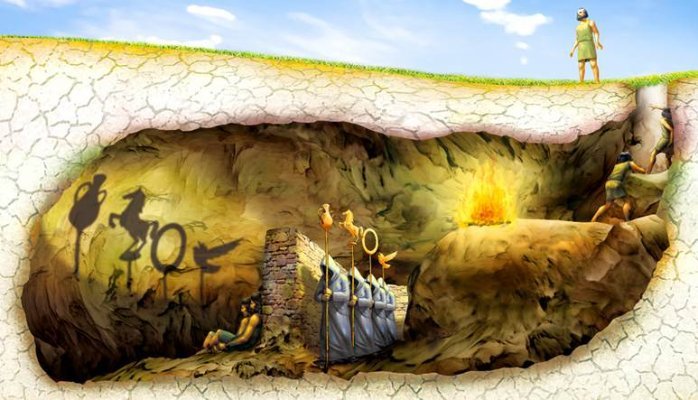
Plato's Cave Metaphor
One can hardly imagine an outlook more different from that of Socrates. Vlastos describes the peripatetic philosopher as one who ambles every day around the agora (or marketplace), barefoot, wearing only one tunic for the year. Socrates, because he cares little for money, or reputation, or anything else other than virtue or wisdom, is certainly unworldly. But he is not otherworldly, for he does not seek mystical union with a Being he can never know or understand. Vlastos again: “For Socrates reality – real knowledge, real virtue, real happiness – is in the world in which he lives... The passionate certainties of his life are in the here and now.”
The next area of contention between Socrates and Plato is in the realm of knowledge and teaching. At his trial, the search for knowledge is uppermost in Socrates' defense: “The greatest good for man is to fashion arguments each day about virtue and the other things you hear me discussing when I examine myself and others... the unexamined life is not for man worth living.” (The Apology) Socrates believed that people do wrong only through ignorance; for him, the search for knowledge was vital to happiness and harmony. Socrates, unlike the Sophists, rejected the idea that virtue could be taught. While a teacher may provide assistance to his students, an individual could find truth only through relentless self-examination, and it was necessary that each person find truth on his own.
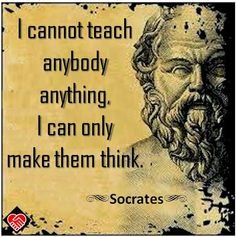
Source
The word “philosopher” is derived from the Greek words “lover of wisdom”. For Socrates, to love, to desire, is to seek. Those with knowledge and wisdom cannot be philosophers, nor can those who scorn or flee from it; thus, for Socrates, only gods and idiots are banned from philosophy. But he welcomes and applauds anyone who honestly seeks wisdom. “For you see that our argument now concerns what even a man of scant intelligence must needs be in utmost earnestness about, namely, the way one ought to live.” (Gorgias)
Not so with Plato: “Philosophy should be wooed by true men, not bastards.” It is incredible to find these words leaving the lips of the Republic's Socrates. Plato's philosopher is no longer the humble man who is aware of his limitations and knows “only that he knows nothing.” He is the Philosopher King. In Plato's later works, no longer do we find the modest seeker, but the proud possessor of truth. The Philosopher does not only hold the key to knowledge, but he has a monopoly on it. And in Plato's ideal state, no one beneath the philosopher king will be allowed to question that authority. Vlastos again: “Plato does not leave this as a matter of inference. He insists that critical discussion of the basic concepts of morality is prohibitively risky for the populace at large, and not only for them – even for the philosophers-to-be prior to the completion of mathematics.” There can be no greater clash between two sets of beliefs. The contrast between Socrates and Plato is that between a rational individualist and a totalitarian demi-god.
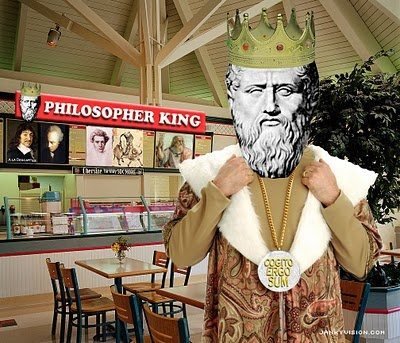
A Totalitarian Demi-God you'd find at Burger King?
The final difference we shall discuss is Socrates' and Plato's idea of politics. I.F. Stone, the journalist-turned-Greek-scholar at age seventy, writes in The Trial of Socrates: “[Socrates] and his disciples saw the human community as a herd that had to be ruled by a king or kings, as sheep by a shepherd. The Athenians, on the other hand, believed that man was a 'political animal'... endowed with reason... and thus capable of governing himself in a polis.” However, Stone is missing the vital difference between the Socrates of the early dialogs and that of the later.
In dealing with Plato, however, he knows his man. Note the following quote from the Republic: “It would be a sin either for mating or anything else in a truly happy society to take place without regulation.” Plato's feelings about his fellow men are made quite transparent in his last work, The Laws: “[T]hey will live the life that their own nature demands, puppets that they are, mostly, and hardly real at all.” For Plato, the individual has nothing to do with politics. Justice is a well-oiled state where the cogs don't matter.
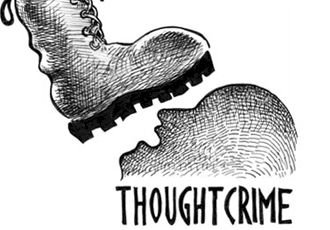
Source
According to Popper's diagnosis of Plato, the inherent imperfection of the individual is exactly that which requires the city-state to be placed higher in value. Only the State can be self-sufficient and perfect. This is the exact opposite of our definition of individualism. Socrates would never have survived seventy years had he lived in either of Plato's hypothetical city-states described in the Republic and The Laws.

Okay - that's it for Part III. I still don't want to overload you! You can find the concluding Part IV HERE.
If you found this post interesting and/or useful, I certainly appreciate all upvotes and follows. And I'd love to continue the conversation in the comments below. Thanks for reading
References
- Plato. Euthyphro, Apology, Crito, Meno, Gorgias, Menexenus. Trans. R.E. Allen. New Haven and London: Harvard University Press, 1984.
- Plato. Laws, The. Trans. Trevor Saunders. London: Penguin Books, 1970.
- Plato. Phaedo. Trans. G.M.A. Grube. Indianapolis: Hackett Publishing Co., 1981.
- Plato. Republic, The. Trans. Desmond Lee. London: Penguin Books, 1974.
- Popper, Karl R. The Open Society and Its Enemies Vol. 1 The Spell of Plato. Princeton: Princeton University Press, 1962.
- Stone, I.F. The Trial of Socrates. New York: Anchor Books, 1989.
- Vlastos, Gregory. Socrates: Ironist and Moral Philosopher. Ithaca: Cornell University Press, 1991.
